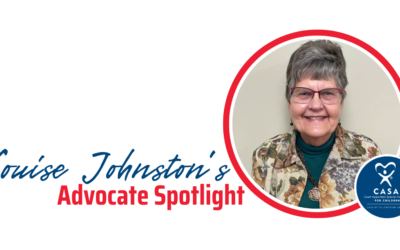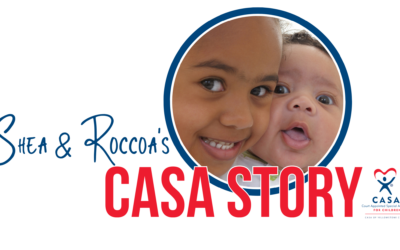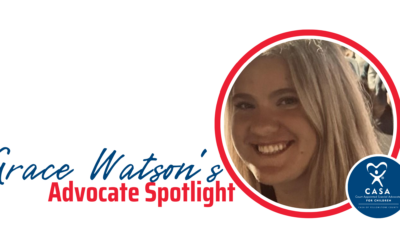For those of you who are not familiar with CASA, it may surprise you to learn that some of our staff members volunteer their time away from work and become Court Appointed Special Advocates for a child or a group of siblings in foster care. There are strict parameters for staff who volunteer as Advocates, to make sure we are not posing any kind of conflict of interest in the case. But that is not what I want to talk about today.
For a long time, I resisted the idea of taking a case of my own because I was worried it would burn me out—as a CASA staff member doing things “CASA” outside of work time. Today, I am happy to say it has been the complete opposite for me, and I have found it to be a deeply rewarding experience that has been filling my “cup” more than draining it. The two kids on my case are amazing human beings and it has been a privilege to get to know them and build a relationship with them for the past six months.
I was visiting my two CASA kids last week—they currently live with their aunt and uncle—when the aunt asked me if I would like to take home my own copies of the kids’ school pictures. This may seem like an insignificant moment for many people who have a mountain of school photos from their own kids, their nieces, nephews, and so on. But for me, this was a ground-breaking moment. I have worked hard to be a consistent presence for my CASA kids. This family has opened their home for me to come visit the kids, even though it means yet another stranger interrupting their lives. The aunt’s simple act of offering me school pictures of the kids was such a kind gesture of trust and welcome.
So many times, in the work of CASA, we struggle to form these relationships, not just with the kids but also with their birth parents, their foster families, teachers, social workers, extended families, and others. Foster care, in particular, is rife with mistrust, broken relationships, and promises unkept.
This visit to the foster home also stands out to me because the 8-year-old on my case asked me if I would help her with her homework. She has been struggling with reading after having missed so much school through the disruptions of COVID-19. She is a shy kid, and school has not been a point of pride or enjoyment for her lately. Her voluntarily bringing schoolwork over to me was another breakthrough moment.
As an organization, we work with children who have seen the worst of the worst. It is hard for them to trust, and what is worse is that they often lack steady and consistent relationships even after they enter foster care. I could write you an entire blog about all the ways an Advocate can make a difference in the lives of kids in foster care. But I would like to propose one simple way an Advocate can make a powerful difference: through relationships. You do not need to be extraordinary, and you do not need to do extraordinary things. You just need to keep showing up for them. That is the most extraordinary thing you can do for these kids.
In closing, my only disappointment is that I cannot put these adorable school photos up on my fridge, nor can I proudly show them to my friends and family, because of the confidentiality in these court cases. I can, however, include the photos in my next court report to the judge who will get to see the sweet faces of these kids. We work hard to give these kids a name, a face, and a voice in court. They are not just a set of initials with a case number—they are real kids with real stories to tell. These are our CASA kids. They are loved, they are seen, and they are cherished. And it is truly a privilege to form relationships with them.
Emily Gaudreau is the Development Director for CASA of Yellowstone County. She also serves as a volunteer Court Appointed Special Advocate.






